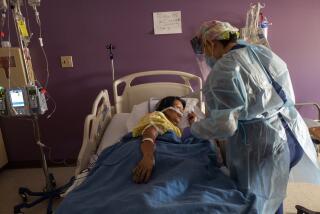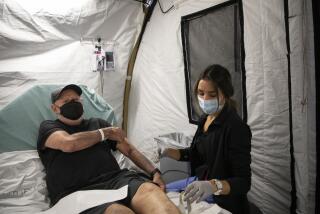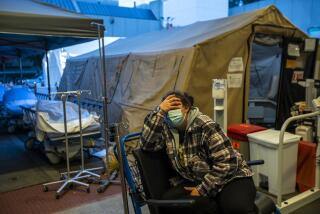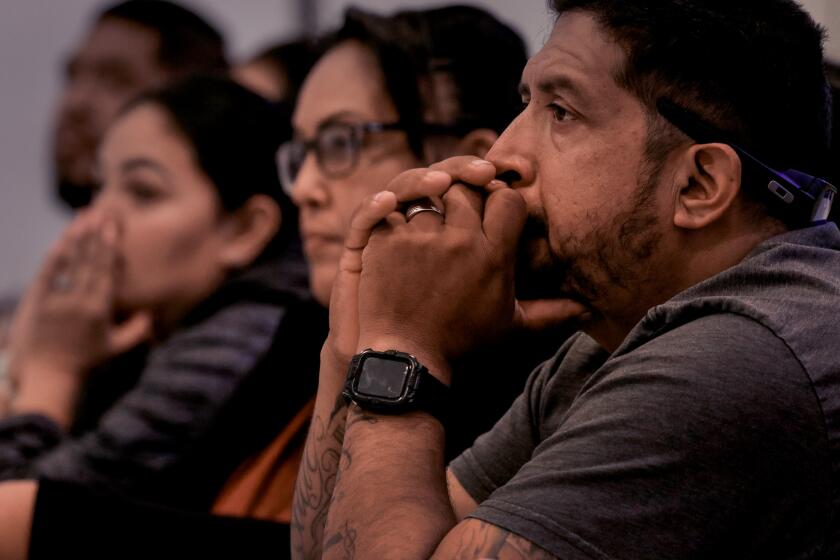San Diego steps up as Imperial County hospitals are hit by rush of patients with the coronavirus
SAN DIEGO — Imperial County’s only two hospitals stopped taking COVID-19 patients delivered by ambulance Tuesday, citing a sudden surge of admissions linked to cross-border traffic originating in Mexicali.
The announcement, made Tuesday morning on Facebook by Dr. Adolphe Edward, chief executive officer of El Centro Regional Medical Center, came as county and state emergency services teams scrambled to help meet demand.
They immediately sent ambulance strike teams to help transfer patients — some to facilities in San Diego County — and promised that a mobile field hospital, staffed with state and federal personnel, should be in place by the end of the week.
It was clear Tuesday evening that El Centro Regional and Pioneers Health Center in Brawley, which reported having 65 and 28 COVID patients respectively as of Tuesday morning, were not yet inundated. Edward stressed that both hospitals remain open for non-COVID cases, and the ambulance diversion of COVID patients was undertaken to preserve the ability to handle emergencies not related to novel coronavirus.
“We want to make sure that we don’t overwhelm either one of the hospitals to the point that we can’t take care of you,” Edward said.
Both hospitals continue to examine and stabilize all patients who arrive for treatment as required by the Emergency Medical Treatment and Labor Act. However, transfers to other hospitals, including those in Riverside County, are being scheduled through a state call center if they have COVID symptoms and need to be admitted to an inpatient unit.
Several healthcare executives in Imperial and San Diego counties said Tuesday that anecdotal reports linked the surge to hospitals in Mexicali, a city with a population of nearly 700,000, declining to take additional patients with possible COVID symptoms, instead directing them north of the border.
“We believe they’re coming from Mexicali, but they’re not Mexican nationals, they’re U.S. citizens,” Edward said.
It’s clear that the effects of the Imperial County activity increase, which local health officials predicted just a few weeks ago, are already spilling over to San Diego County.
Scripps Health reported receiving five transfers from the east Tuesday, with several more possibly being transferred soon. UC San Diego Health reported that its hospitals currently have eight COVID patients with Imperial County ZIP Codes. Five of those were admitted in the past five days, and more were on the way as of Tuesday night, said Dr. Christopher Longhurst, chief information officer at UC San Diego Health.
“The current inbound is fluctuating,” Longhurst said.
Kristi Koenig, director of San Diego County’s emergency medical system, confirmed Tuesday night that an ambulance strike team was sent east Tuesday to help another team already operating in the Imperial County area, and state and federal agencies are working to move a mobile field hospital south from Santa Clara to Imperial County. The 125-bed unit was likely to have about 80 beds available at the outset, she said.
Koenig, like the other executives involved, said she had not yet received confirmation of exactly what’s going on in Mexico and how the situation south of the border is affecting patient patterns popping up in Southern California. But based on what was being reported out of Imperial, and on the long-running amount of elevated COVID activity at South Bay hospitals, the physician said there is reason to be concerned that the trend may continue.
“From what we can see, it looks really worrisome,” Koenig said.
With 161 beds at El Centro Regional and another 107 not far away at Pioneers, it was clear that the 93 total COVID patients cited Tuesday were not enough to fill up every available bed in Imperial County. But Kathy Kennerson, chief strategic officer at El Centro Regional, said that capacity is not just about beds. It’s about having enough medical personnel to staff those beds, and COVID patients, with requirements for constant donning and doffing of personal protective equipment, demand more resources.
“It’s challenging to staff in the current situation,” Kennerson said. “We’re trying to get more nurses, but that is a limited capacity in Imperial County.”
Larry Lewis, chief executive officer at Pioneers, agreed, saying in an email Tuesday evening that Imperial County has seen a 48% increase in COVID patients over the past three days, forcing a scramble for staffing.
“While we have sufficient inpatient ICU and medical-surgical beds, ventilators, negative air space and equipment to add many more patients, it will take us a little bit of time to assemble additional nursing and respiratory staff,” Lewis said.
Though San Diego County leaders have asked the federal and state government for additional resources at the border, the immediate focus is on backstopping Imperial County hospitals, Koenig said. But lines of communication, she added, remain open.
“We’re monitoring the situation very closely, and we’re in very close contact with the federal government and with our colleagues at the state,” Koenig said.
It’s clear that it has only been San Diego County’s larger healthcare systems that have kept Chula Vista hospitals from filling up.
Chris Van Gorder, chief executive of Scripps Health, said that daily totals from the Border Patrol show that 70,000 people crossed into San Diego County from Mexico on Monday alone. So far, he said, Scripps has transferred a total of 56 COVID patients north from Scripps Mercy Hospital Chula Vista. The news that the average rate of positive COVID tests across San Diego is declining, Van Gorder said, is belied by what’s going on in the south.
“We’re still seeing an 18% positive rate in Chula Vista,” Van Gorder said.
More to Read
Sign up for Essential California
The most important California stories and recommendations in your inbox every morning.
You may occasionally receive promotional content from the Los Angeles Times.











